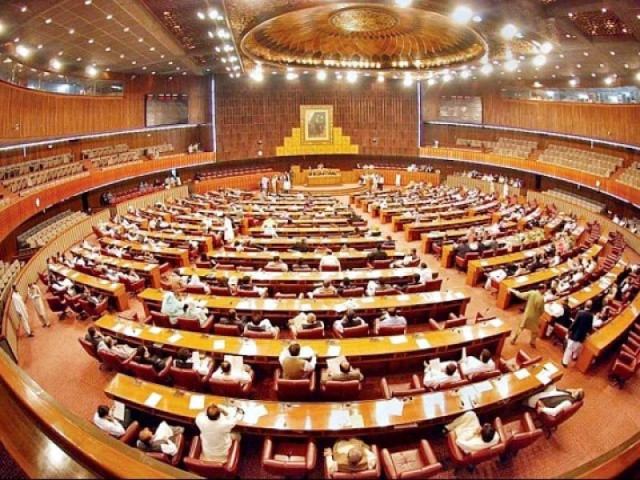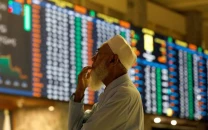Major budget measures to kick in from mid-May
Senate panel endorses govt’s view to let changes come into effect this month

The committee rejected a further 1% increase in sales tax, which is aimed at increasing the effective rate to 20%. PHOTO: FILE
The Senate Standing Committee on Finance’s endorsement of the official move to enforce certain tax measures from this month strengthens the government’s hands to immediately take these steps that would lead to an increase in prices of thousands of goods. Pakistan Peoples Party’s Senate Farooq H Naek chaired the meeting.
Unlike income tax and sales tax measures that will take effect from July 1, when the new fiscal year starts, the increase in customs duties and federal excise duties rates will be enforced from the next day of President Mamnoon Hussain’s consent to the Finance Bill 2018. The Senate Standing Committee on Finance, which is currently discussing the budget, also approved clause 1 (3) of the Finance Bill 2018, which pertains to enforcing certain new measures immediately after its approval from the NA.
Budget measures lack clear strategy: IPR
The Standing Committee could not approve a recommendation to “advise the federal government to withdraw the budget for 2018-19 and instead present only a four-month budget”. The majority of the sitting senators opposed the recommendation. However, chairman of the standing committee deferred the final decision on the grounds that the mover of the recommendation was not present.
But the committee opposed to increase the petroleum levy rates by threefold to Rs30 per litre for all products. It instead recommended the government that the petroleum levy rates should be increased by only 25%. This means the new petroleum levy rate for petrol will be Rs13 per litre instead of the government-proposed Rs30 per litre. However, the standing committee recommendations are not binding on the government.
The committee also rejected a further 1% increase in sales tax, which is aimed at increasing the effective rate to 20%.
It is expected that the budget will be passed by the National Assembly on May 15 and certain tax measures will be in effect from the very next day, said Sarfraz Sheikh, joint secretary of the Ministry of Law in the committee meeting.
With the immediate enforcement, the customs duties on 7,200 tariff lines will increase by another 1% from the middle of this month. This will affect almost every product that is imported or locally manufactured by using imported raw materials.
The cigarettes will become expensive by another 6% this month and the prices of 50 kilogram bag of cement will further go up by Rs12.50 from May 16. But the standing committee rejected the Rs10 per kilogram levy on tobacco on the grounds that the finance ministry did not have the power to impose this levy.
The representative also backed the view that the finance ministry did not have powers to impose this levy and this could be challenged in courts. Some committee members were of the view that the Federal Board of Revenue (FBR) was promoting cigarette smoking in the country, as its tax structure led to a reduction in prices. However, FBR Chairman Tariq Pasha denied this.
Subject to approval of the budget on May 15, non-filers of income tax returns will not be able to buy a new car or import one from May 16, said Sarfraz Sheikh while interpreting the government-proposed Finance Bill.
PTI Senator Mohsin Aziz also backed the proposal to enforce the new tax measures immediately. If these measures are not enforced with immediate effect, the trading activities could come to a standstill due to hoarding by traders for profiteering, said Senator Aziz.
The government has proposed an additional Rs29 billion in customs duty measures in the budget. The most regressive measure was the FBR’s decision to increase 1% additional duty on almost all imported items except those that come on concessionary rates under the bilateral free trade agreements. It was already charging 1% additional customs duty on all the four slabs.
Budget 2018-19: Focus is more on voters rather than economy
The standing committee also endorsed the government’s proposal to give legal cover to imposition of regulatory duties on 350 items that the Sindh High Court had struck down. The committee approved the immunity clause of the Finance Bill.
In order to circumvent the historical judgment of the Supreme Court of Pakistan, the former finance minister had inserted a clause in the law that allowed him to exercise cabinet powers.
But in February this year, the SHC had struck down this amendment to the Customs Act which became the basis for imposition of the regulatory duty on more than 356 goods in order to curb growing imports.
Published in The Express Tribune, May 4th, 2018.
Like Business on Facebook, follow @TribuneBiz on Twitter to stay informed and join in the conversation.



















COMMENTS
Comments are moderated and generally will be posted if they are on-topic and not abusive.
For more information, please see our Comments FAQ